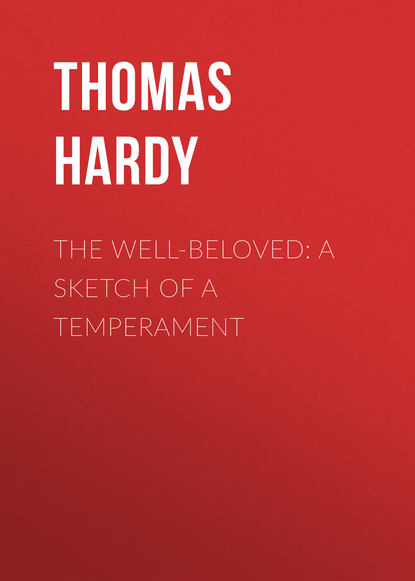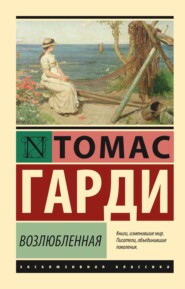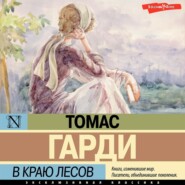По всем вопросам обращайтесь на: info@litportal.ru
(©) 2003-2025.
✖
The Well-Beloved: A Sketch of a Temperament
Настройки чтения
Размер шрифта
Высота строк
Поля
‘It was not necessary to keep it, so I destroyed it.’
Mrs. Pierston did not press her further on the subject, and Avice showed no disposition to continue it. They retired rather early, as they always did, but Pierston remained pacing about his studio a long while, musing on many things, not the least being the perception that to wed a woman may be by no means the same thing as to be united with her. The ‘old friend’ of Avice’s remark had sounded very much like ‘lover.’ Otherwise why should the letter have so greatly disturbed her?
There seemed to be something uncanny, after all, about London, in its relation to his contemplated marriage. When she had first come up she was easier with him than now. And yet his bringing her there had helped his cause; the house had decidedly impressed her – almost overawed her, and though he owned that by no law of nature or reason had her mother or himself any right to urge on Avice partnership with him against her inclination, he resolved to make the most of having her under his influence by getting the wedding details settled before she and her mother left.
The next morning he proceeded to do this. When he encountered Avice there was a trace of apprehension on her face; but he set that down to a fear that she had offended him the night before by her taciturnity. Directly he requested her mother, in Avice’s presence, to get her to fix the day quite early, Mrs. Pierston became brighter and brisker. She, too, plainly had doubts about the wisdom of delay, and turning to her daughter said, ‘Now, my dear, do you hear?’
It was ultimately agreed that the widow and her daughter should go back in a day or two, to await Pierston’s arrival on the wedding-eve, immediately after their return.
* * *
In pursuance of the arrangement Pierston found himself on the south shore of England in the gloom of the aforesaid evening, the isle, as he looked across at it with his approach, being just discernible as a moping countenance, a creature sullen with a sense that he was about to withdraw from its keeping the rarest object it had ever owned. He had come alone, not to embarrass them, and had intended to halt a couple of hours in the neighbouring seaport to give some orders relating to the wedding, but the little railway train being in waiting to take him on, he proceeded with a natural impatience, resolving to do his business here by messenger from the isle.
He passed the ruins of the Tudor castle and the long featureless rib of grinding pebbles that screened off the outer sea, which could be heard lifting and dipping rhythmically in the wide vagueness of the Bay. At the under-hill island townlet of the Wells there were no flys, and leaving his things to be brought on, as he often did, he climbed the eminence on foot.
Half-way up the steepest part of the pass he saw in the dusk a figure pausing – the single person on the incline. Though it was too dark to identify faces, Pierston gathered from the way in which the halting stranger was supporting himself by the handrail, which here bordered the road to assist climbers, that the person was exhausted.
‘Anything the matter?’ he said.
‘O no – not much,’ was returned by the other. ‘But it is steep just here.’
The accent was not quite that of an Englishman, and struck him as hailing from one of the Channel Islands. ‘Can’t I help you up to the top?’ he said, for the voice, though that of a young man, seemed faint and shaken.
‘No, thank you. I have been ill; but I thought I was all right again; and as the night was fine I walked into the island by the road. It turned out to be rather too much for me, as there is some weakness left still; and this stiff incline brought it out.’
‘Naturally. You’d better take hold of my arm – at any rate to the brow here.’
Thus pressed the stranger did so, and they went on towards the ridge, till, reaching the lime-kiln standing there the stranger abandoned his hold, saying: ‘Thank you for your assistance, sir. Good-night.’
‘I don’t think I recognize your voice as a native’s?’
‘No, it is not. I am a Jersey man. Goodnight, sir.’
‘Good-night, if you are sure you can get on. Here, take this stick – it is no use to me.’ Saying which, Pierston put his walking-stick into the young man’s hand.
‘Thank you again. I shall be quite recovered when I have rested a minute or two. Don’t let me detain you, please.’
The stranger as he spoke turned his face towards the south, where the Beal light had just come into view, and stood regarding it with an obstinate fixity. As he evidently wished to be left to himself Jocelyn went on, and troubled no more about him, though the desire of the young man to be rid of his company, after accepting his walking-stick and his arm, had come with a suddenness that was almost emotional; and impressionable as Jocelyn was, no less now than in youth, he was saddened for a minute by the sense that there were people in the world who did not like even his sympathy.
However, a pleasure which obliterated all this arose when Pierston drew near to the house that was likely to be his dear home on all future visits to the isle, perhaps even his permanent home as he grew older and the associations of his youth re-asserted themselves. It had been, too, his father’s house, the house in which he was born, and he amused his fancy with plans for its enlargement under the supervision of Avice and himself. It was a still greater pleasure to behold a tall and shapely figure standing against the light of the open door and presumably awaiting him.
Avice, who it was, gave a little jump when she recognized him, but dutifully allowed him to kiss her when he reached her side; though her nervousness was only too apparent, and was like a child’s towards a parent who may prove stern.
‘How dear of you to guess that I might come on at once instead of later!’ said Jocelyn. ‘Well, if I had stayed in the town to go to the shops and so on, I could not have got here till the last train. How is mother? – our mother, as I shall call her soon.’
Avice said that her mother had not been so well – she feared not nearly so well since her return from London, so that she was obliged to keep her room. The visit had perhaps been too much for her. ‘But she will not acknowledge that she is much weaker, because she will not disturb my happiness.’
Jocelyn was in a mood to let trifles of manner pass, and he took no notice of the effort which had accompanied the last word. They went upstairs to Mrs. Pierston, whose obvious relief and thankfulness at sight of him was grateful to her visitor.
‘I am so, O so glad you are come!’ she said huskily, as she held out her thin hand and stifled a sob. ‘I have been so – ’
She could get no further for a moment, and Avice turned away weeping, and abruptly left the room.
‘I have so set my heart on this,’ Mrs. Pierston went on, ‘that I have not been able to sleep of late, for I have feared I might drop off suddenly before she is yours, and lose the comfort of seeing you actually united. Your being so kind to me in old times has made me so sure that she will find a good husband in you, that I am over anxious, I know. Indeed, I have not liked to let her know quite how anxious I am.’
Thus they talked till Jocelyn bade her goodnight, it being noticeable that Mrs. Pierston, chastened by her illnesses, maintained no longer any reserve on her gladness to acquire him as her son-in-law; and her feelings destroyed any remaining scruples he might have had from perceiving that Avice’s consent was rather an obedience than a desire. As he went downstairs, and found Avice awaiting his descent, he wondered if anything had occurred here during his absence to give Mrs. Pierston new uneasiness about the marriage, but it was an inquiry he could not address to a girl whose actions could alone be the cause of such uneasiness.
He looked round for her as he supped, but though she had come into the room with him she was not there now. He remembered her telling him that she had had supper with her mother, and Jocelyn sat on quietly musing and sipping his wine for something near half-an-hour. Wondering then for the first time what had become of her, he rose and went to the door. Avice was quite near him after all – only standing at the front door as she had been doing when he came, looking into the light of the full moon, which had risen since his arrival. His sudden opening of the dining-room door seemed to agitate her.
‘What is it, dear?’ he asked.
‘As mother is much better and doesn’t want me, I ought to go and see somebody I promised to take a parcel to – I feel I ought. And yet, as you have just come to see me – I suppose you don’t approve of my going out while you are here?’
‘Who is the person?’
‘Somebody down that way,’ she said indefinitely. ‘It is not very far off. I am not afraid – I go out often by myself at night hereabout.’
He reassured her good-humouredly. ‘If you really wish to go, my dear, of course I don’t object. I have no authority to do that till tomorrow, and you know that if I had it I shouldn’t use it.’
‘O but you have! Mother being an invalid, you are in her place, apart from – to-morrow.’
‘Nonsense, darling. Run across to your friend’s house by all means if you want to.’
‘And you’ll be here when I come in?’
‘No, I am going down to the inn to see if my things are brought up.’
‘But hasn’t mother asked you to stay here? The spare room was got ready for you… Dear me, I am afraid I ought to have told you.’
‘She did ask me. But I have some things coming, directed to the inn, and I had better be there. So I’ll wish you good-night, though it is not late. I will come in quite early to-morrow, to inquire how your mother is going on, and to wish you good-morning. You will be back again quickly this evening?’
‘O yes.’
‘And I needn’t go with you for company?’
‘O no, thank you. It is no distance.’
Pierston then departed, thinking how entirely her manner was that of one to whom a question of doing anything was a question of permission and not of judgment. He had no sooner gone than Avice took a parcel from a cupboard, put on her hat and cloak, and following by the way he had taken till she reached the entrance to Sylvania Castle, there stood still. She could hear Pierston’s footsteps passing down East Quarriers to the inn; but she went no further in that direction. Turning into the lane on the right, of which mention has so often been made, she went quickly past the last cottage, and having entered the gorge beyond she clambered into the ruin of the Red King’s or Bow-and-Arrow Castle, standing as a square black mass against the moonlit, indefinite sea.
VI. THE WELL-BELOVED IS – WHERE?
Mrs. Pierston passed a restless night, but this she let nobody know; nor, what was painfully evident to herself, that her prostration was increased by anxiety and suspense about the wedding on which she had too much set her heart.
During the very brief space in which she dozed Avice came into her room. As it was not infrequent for her daughter to look in upon her thus she took little notice, merely saying to assure the girl: ‘I am better, dear. Don’t come in again. Get to sleep yourself.’
The mother, however, went thinking anew. She had no apprehensions about this marriage. She felt perfectly sure that it was the best thing she could do for her girl. Not a young woman on the island but was envying Avice at that moment; for Jocelyn was absurdly young for three score, a good-looking man, one whose history was generally known here; as also were the exact figures of the fortune he had inherited from his father, and the social standing he could claim – a standing, however, which that fortune would not have been large enough to procure unassisted by his reputation in his art.
But Avice had been weak enough, as her mother knew, to indulge in fancies for local youths from time to time, and Mrs. Pierston could not help congratulating herself that her daughter had been so docile in the circumstances. Yet to every one except, perhaps, Avice herself, Jocelyn was the most romantic of lovers. Indeed was there ever such a romance as that man embodied in his relations to her house? Rejecting the first Avice, the second had rejected him, and to rally to the third with final achievement was an artistic and tender finish to which it was ungrateful in anybody to be blind.

















